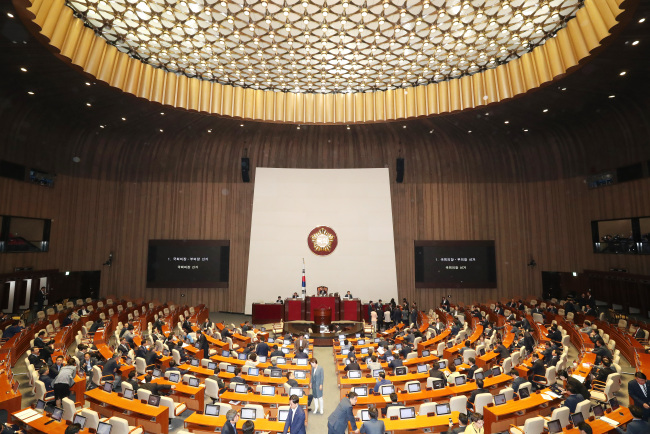The National Assembly elected the chairs of standing committees Monday, setting the scene for parliament to fully operate following more than 40 days of legislative vacuum.
Parliament held a plenary session to vote on the chiefs of the 16 committees for the second half of the 20th parliament's four-year term. Rival parties reached an agreement last week over the formation of parliament's new leadership and its 18 committees.
The heads of another two committees will be voted on next Thursday. Lawmakers also approved a bill to split the committee on education, culture, sports and tourism into two panels -- one handling education and the other in charge of the remaining affairs.
The National Assembly was normalized last Friday with the election of the new leadership, including Speaker Moon Hee-sang.

The former speaker's two-year term ended in May, but the parties started consultations over the formation of the committees in late June as opposition parties were stung by their resounding defeat in the June 13 local elections.
Monday's voting was largely a formality as parties picked candidates for the chairs of committees assigned to them or held elections for those posts.
Under last week's deal, the ruling Democratic Party will chair eight committees, while the main opposition Liberty Korea Party and the minor Bareunmirae Party will head seven and two panels, respectively. A joint negotiation bloc of two minor parties will lead one committee.
In line with parliamentary customs, the DP will lead the house steering committee, a key committee that handles the parliament's overall operations and oversees the presidential office. The LKP will chair the judiciary committee, a key panel for the passage of bills.
The DP had wanted the judiciary committee, claiming that the opposition-led panel sometimes exerts too much authority by overhauling motions in a way that hampers their original intentions. The LKP stressed its role in providing checks and balances in reviewing the government-sponsored bills.
But instead of letting the largest opposition party be in charge of the committee, the parties also agreed to discuss how to limit the judiciary committee's authority at a sub-panel on improving the operations of the standing committees.
Apart from the steering committee, the DP will lead the chairmanships of the committees on strategy and finance; national policy; science, ICT, broadcasting and communications; culture and sports; defense; public administration and security; and gender equality and family.
Other than the judiciary panel, the LKP will head the committees on budget and accounts; trade industry, smaller firms and startups; land infrastructure and transport; foreign affairs and unification; health and welfare; and environment and labor.
The BP will lead the committees on intelligence and eduction while the minor opposition Party for Democracy and Justice will chair the committee on agriculture, food, rural affairs, oceans and fisheries.
The completion of forming the committees is expected to give a boost to parliament in handling a slew of key pending bills. The government hopes for the swift passage of bills on day-to-day issues and reform motions to prop up the slowing economy. (Yonhap)








![[KH Explains] Hyundai's full hybrid edge to pay off amid slow transition to pure EVs](http://res.heraldm.com/phpwas/restmb_idxmake.php?idx=644&simg=/content/image/2024/04/18/20240418050645_0.jpg&u=20240419100350)







![[From the Scene] Monks, Buddhists hail return of remains of Buddhas](http://res.heraldm.com/phpwas/restmb_idxmake.php?idx=652&simg=/content/image/2024/04/19/20240419050617_0.jpg&u=20240419175937)

![[KH Explains] Hyundai's full hybrid edge to pay off amid slow transition to pure EVs](http://res.heraldm.com/phpwas/restmb_idxmake.php?idx=652&simg=/content/image/2024/04/18/20240418050645_0.jpg&u=20240419100350)

![[Today’s K-pop] Illit drops debut single remix](http://res.heraldm.com/phpwas/restmb_idxmake.php?idx=642&simg=/content/image/2024/04/19/20240419050612_0.jpg&u=)